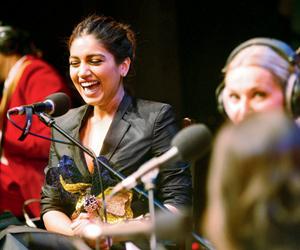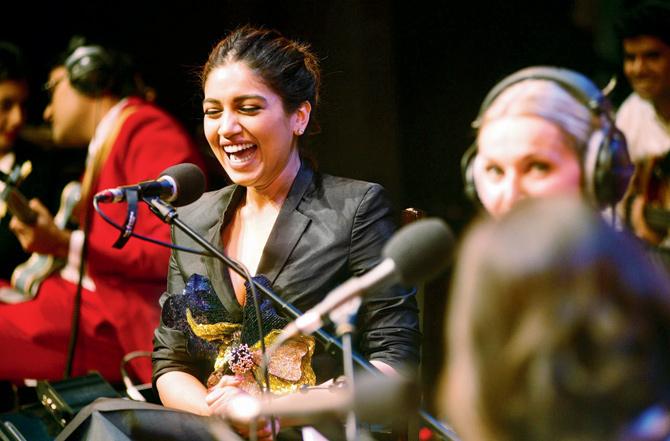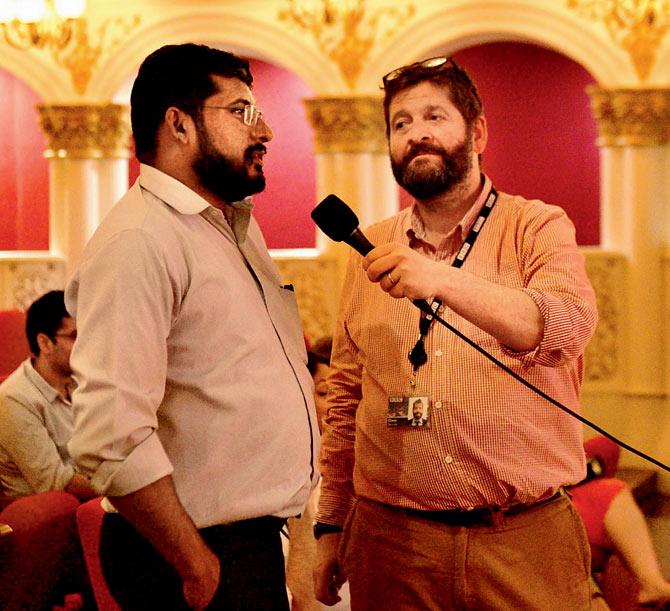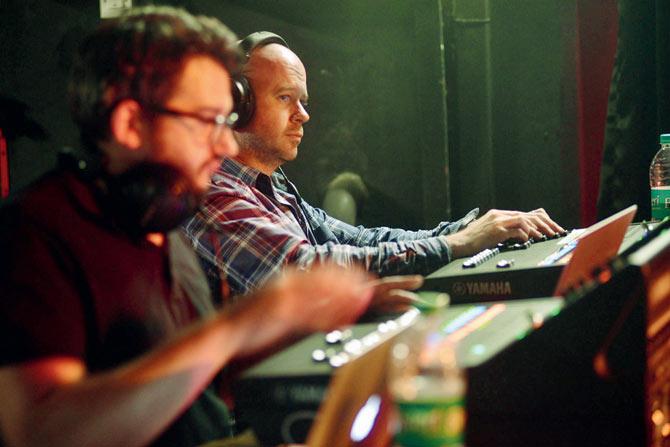Going backstage at a BBC radio show that brings together names from cinema, indie music, stand-up comedy and spoken word to prove the city's arts' scene is nothing short of buoyant

On the stage at the majestic Royal Opera House, artistes take their seat in a semicircle for what is an unusual gathering. At the centre is British radio and television presenter Nikki Bedi, who, along with familiarising her guests with the flow of the show is also breaking the ice between participants. They are here to record The Arts Hour, a BBC radio production that goes on a tour once a month to capture the best in arts across the world. The Mumbai edition airs today.

Actor Bhumi Pednekar (with Nikki Bedi to her right) calls out the boors behind Padmavati protests. Pics/Pic/Bipin Kokate
In the city on the evening of November 22, the researchers have picked six artistes who they feel best represent the dynamic cultural scene of the city. Flanking Bedi are film critic and director of the Mumbai Film Festival Anupama Chopra, and actor Bhumi Pednekar. Seated next to them are stand-up comedian, screenwriter and novelist Anuvab Pal, and Shamir Reuben, head of content and social media at the spoken word collective, Kommune. On either side of the stage, fine-tuning their arrangements are the popular Hindi rock ensemble Anand Bhaskar Collective and pop duo from Kolkata — with a big fan following in Mumbai — Parekh & Singh in signature fruity suits. "The show is a way of seeing a people and their culture, and understanding their politics and issues through the prism of art. Stand-up comedy and spoken word are burgeoning fields in Mumbai. There is also a sea change in the kind of subjects that Indian cinema is choosing. Issues like sanitation, erectile dysfunction and fat shaming are not just making it to film, they are also managing to attract audiences into theatres," says Bedi about why it was a good time to come to Mumbai.

Nischay Parekh readies to perform the band's hit song
For this edition's research, Bedi, who was born a Moolgaokar and has roots in Mumbai, played the fact checker for producer Nicki Paxman along with providing other insider inputs. A regular feature of the show, The Culture Cab, involves the presenter hailing a cab with an artiste who then takes her around the city to explore it like a local. Though her Mumbai guide was Pal, with whom she explored the splash of global colours at the ongoing Sassoon Docks art project and the murals of Bandra, Bedi shared her favourite part of the city with him, too — Walkeshwar's Banganga.
Throughout the recording that lasted two and a half hours, the team's homework kept the conversation alive and relevant. Bedi, a natural at hosting, puts her guests at ease. It comes across in Pednekar's candour, who minces no words when asked about the ongoing controversy around Padmavati. "You know, these are people who don't give a s**t about history," she says, a word Paxman gets politely replaced at the end of the show with the milder "damn". Bedi then moves on to ask Pal and Reuben if comedy and spoken word have become popular for similar reasons and how social media has played a part. With artistes as guests, each segment packs in a performance. While Pal's jibes about SoBo residents have the audience in splits, Reuben's poetry moves many to tears. Vocalist Nischay Parekh of Parekh & Singh shares the inspiration behind their music video with a million hits, I Love You Baby, I Love You Doll, before performing it, and Anand Bhaskar shares why all his compositions are in Hindi before segueing the show to its end with a rendition of Fanaa.

An audience member comments about the need to see more everyday people in films
Rahul Baswani, who came to know of the show through Pal's tweet, is happy to have made it in the audience. "I listen to a lot of podcasts. So, the most fascinating bit for me was towards the end when they did the retakes," he says. In the green room, mutual understanding and fandom fill the air. "At the end of the day, we are all artistes, and we could feel the synergy and a shared language throughout," says Parekh, who has just promised Pal that he'll be there for his Kolkata gig the next day, even as Pal admits that the music duo is everything he would have wanted to be as a 27-year-old.

The sound engineers at work
Chopra, on the other hand, is happy that the show recognises the power of Indian cinema and how it is evolving. "Outside India, there is a fixed notion of what Bollywood is. But there is a different language [spoken] now, which most people don't know of. I am hoping that the show will communicate that." For Reuben, it has been a platform for artistic exchange. "The beauty of tonight was people might have come to watch comedy and they learnt a bit about spoken word. Or that they wanted to hear a poem and they left with music," he says. "For the BBC to say that there is something stirring in Mumbai is a statement."
 Subscribe today by clicking the link and stay updated with the latest news!" Click here!
Subscribe today by clicking the link and stay updated with the latest news!" Click here!









